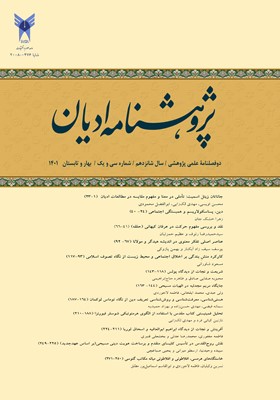شریعت و نجات از دیدگاه پولس
محورهای موضوعی : مسیحیت
محبوبه صفایی صادق
1
,
طاهره حاج ابراهیمی
2
*
![]()
1 - دانشجوی دکترای ادیان و عرفان دانشگاه آزاد تهران شمال
2 - دانشیار گروه ادیان و عرفان، دانشکده حقوق، الهیات و علوم سیاسی، واحد علوم و تحقیقات، دانشگاه آزاد اسلامی، تهران، ایران
کلید واژه: شریعت, ایمان, نجات, عادل شمردگی, پولس,
چکیده مقاله :
سخنان متناقض پولس دربارۀ شریعت درنامههایش، متفکران را به بحث در این باره وا داشته است. مسأله این است که پولس با آنکه خود، فریسی متعصب و شریعت مداری بوده و اعتقاد داشته که شریعت روحانی و مقدس است و همۀ -شریعت باید انجام شود، موضوع آزادی از شریعت را مطرح میکند و تصریح میکندکه هیچکس با اعمال شریعت پاک و درستکار شمرده نمیشود. در اینجا این سؤال مطرح میشودکه اگرکسی با اعمال شریعت پاک و درستکار شمرده نمیشود، پس چرا خداوند شریعت را عطا کرد؟ به نظر میرسد راز نگاه منفی پولس به شریعت در پاسخ او به این سؤال نهفته است. پولس معتقد است که اعمال شریعت، ثمرۀ ایمان و نشانۀ نجات هستند ولی بدون ایمان نجات بخش نبوده بلکه سبب محکومیت و هلاکت ابدی میشوند و غضب الهی را بیشتر برمیانگیزند. بنابراین او، دراین باره که چگونه انسان میتواند پاک و درستکار شمرده شود و نجات یابد، همواره گفته است: از طریق مسیح و نه بهوسیلۀ اعمال شریعت. بحث پولس در اینجا علیه شریعت نبوده، بلکه بحثی بسیار خاص و نیازمند تبیین است. در این مقاله به بررسی دیدگاه پولس دربارۀ شریعت و رابطۀ آن با نجات به روش توصیفی- تحلیلی پرداخته میشود.
Paul's contradictory view about law has provoked Christian thinkers to argue and dispute about it. Although Paul was from a Pharisee background and considered the religious law sacred and binding but he propounds the case of redemption from the curse of the law, and asserts that no one justify by law. Here the question is if no one can justify by law, why did God originally give us the law? It seems that the secret of the Paul's negative view about law is concealed in this question. If it is asked how one can be justified? Paul always says that "by Christ" and "not by law". Therefore, the only requirement to enter the community of believers is the faith in Christ, not acceptance of the law. But he emphasizes that after coming into Christian life, a Christian should act according to the divine commandments. So, it must be said that Paul was not against the law. In this article, Paul's view about religious law and its connection with salvation is surveyed in a descriptive- analytic method.
- ابن منظور، محمد بن مکرم، لسان العرب، بیروت، دارالصادر،1414ق.
- بارکلی، ویلیام، تفسیر العهد الجدید، مصر، دارالثقافه،1982.
- ترجمه تفسیری کتاب مقدس، بیجا، انجمن جهانی کتاب مقدس،1374.
- تیسن، هنری، الهیات مسیحی، ترجمه: ط. طه، س میکائیلیان، تهران، انتشارات حیات ابدی، بیتا.
-کونگ، هانس، تاریخ کلیسای کاتولیک، ترجمه حسن قنبری، قم، مرکزمطالعات ادیان ومذاهب، 1384. - محمدیان، بهرام و دیگران، دایرةالمعارف کتاب مقدس، تهران، روز نو، 1380. - مسترهاکس، قاموس کتاب مقدس، تهران، انتشارات اساطیر، 1383.
- هیل، توماس، تورسون، استیفان، تفسیرکاربردی عهدجدید، ترجمه: آرمان رشدی، فریبرزخندانی، ویرایش: ساروخاچیکی، بیجا، بینا. 2001.
- هیلنز، جان. آر، فرهنگ ادیان جهان، علی پاشایی، قم، انتشارات دانشگاه ادیان ومذاهب، 1384
-Aquinas, Thomas, Summa Theologica, First Part of the Second Part, Translated by the Fathers of English Dominican Provincen, and from the works of John Duns Scotus and Arranged and edited by Jerome of Montefortino, 2006.
-Barth, Karl, The Epistle to the Romans, E. C. Hoskyns(trans.), London, Oxford University Press,1933.
-Bayes, Jonathan F., The threefold division of the law, Newcastle, published by: The Christian Institute, 2004.
-Benner, Jeff A., "Salvation", Ancient Hebrew Dictionary. Topics>>Hebrew Word Studies>>, 1999.
-Bromiley, G. W., "Law in the New Testament: III. Law in the Epistles", The International Standard Bible Encyclopedia, Published by Wm. B. Eerdmans.1939.
-Buttrich, G. A., The Interpreter's Bible, The United States of America, Edited by: George Arthur Buttrich, 1995.
-Dunn, James D. G., Jesus, Paul, and the Law: Studies in Mark and Galatians, First published in Britain, by SPCK, 1999.
-Dunn, James D. G., "Works of Law and the Curse of the Law"(Galatians 3.10- 14)", New Testament Studies, vol. 31, 1985, p.524-542.
-Dunn, James D. G., The Theology of Paul the Apostle, Wm. B. Eerdmans Publishing Company, Michigan Cambridge,1998.
-Gaston, Lloyed, "Paul and Torah", Anti-Semitism and the Foundations of Christianity, New York, Paulist Press, 1979.
-Hennessey, J., "Good Works", New Catholic Encyclopedia, Washington Galf Group Staff in Association with The Catholic University of America, Washington, vol.12, 2019, p.623.
-Hubner, Hans, Riches, John, Law in Paul's Thought, Published by T&T Clark International A Continuum Imprint The Tower Bulding, NewYork, 1986.
-Kung, Hans, Great Christian Thinkers, John Bowden (trans.), Printed in the United States of America, 1994.
-Luther, Martin, Commentary on the Epistle to the Galatians, T. Graebner (trans.), Pennsylvania, 2013.
-McGrath, Alister, Christian Theology Reader, Edited by: Alister McGrath, Anniversary Fifth Edition, 2017.
-Sanders, E.p., Paul and the Law and the Jewish People, Philadelphia, Fortress Press, 1983.
-Schreiner, Thomas R., Jul., "Works of Law in Paul", Novum Testamentum, vol. 33, Fasc.3, Publshed by: Brill,1985, pp. 217-244.
-Smart, Ninian, "Soteriology", The Encyclopedia of Religion, Macmillan Reference U.S.A, Editor in Chief: Lindsay Jones, Thomson Gale, 1987.
-Tischler, N. M., All Things in the Bible: An Encyclopedia of the Biblical World, Illustrator: Ellen Johnston McHenry, London, Greenwood Press, 2006.
-Tyndale, William, Paul and the Law (1Corinthians 15/1-4; Romans 4/4 -5), Printed by: Don Samdahl, 2015.
_||_
